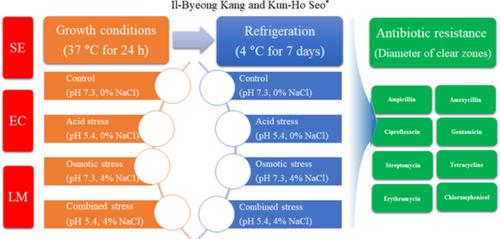当前位置:
X-MOL 学术
›
J. Food Saf.
›
论文详情
Our official English website, www.x-mol.net, welcomes your feedback! (Note: you will need to create a separate account there.)
Variation of antibiotic resistance in Salmonella Enteritidis, Escherichia coli O157:H7, and Listeria monocytogenes after exposure to acid, salt, and cold stress
Journal of Food Safety ( IF 2.4 ) Pub Date : 2020-04-20 , DOI: 10.1111/jfs.12804 Il‐Byeong Kang 1 , Kun‐Ho Seo 1
Journal of Food Safety ( IF 2.4 ) Pub Date : 2020-04-20 , DOI: 10.1111/jfs.12804 Il‐Byeong Kang 1 , Kun‐Ho Seo 1
Affiliation

|
Bacteria with antibiotic‐resistant could seriously threaten to human health, increasing the treatment cost for infections and negatively affecting treatment outcomes. Stress adaptation is one possible mechanism for the acquisition or enhancement of antibiotic resistance in bacteria as a result of cross‐protection. In this study, the effects of acid, salt, and cold stress on the antibiotic resistance of Salmonella Enteritidis, Listeria monocytogenes, and Escherichia coli O157:H7 were investigated using the disc diffusion method. For S. Enteritidis, acidic growth conditions increased resistance to ciprofloxacin and erythromycin (p < .05), and addition of 4% NaCl to growth media decreased resistance to chloramphenicol (p < .05). Irrespective of pH and the NaCl concentration of the growth medium, refrigerated E. coli O157:H7 showed increased resistance to amoxycillin, ciprofloxacin, gentamicin, streptomycin, and erythromycin (p < .05). Acid‐adapted L. monocytogenes showed decreased the resistance to amoxycillin, ampicillin, chloramphenicol, ciprofloxacin, erythromycin, gentamicin, streptomycin, and tetracycline (p < .05). In conclusion, prolonged exposure of foodborne pathogens to acid, salt, and cold stress alters their antibiotic resistance. However, the effect of acid, salt, and cold stress on bacterial antibiotic resistance depend on both the bacterial species and the specific antibiotic. Therefore, multiple factors need to be considered for a foodborne antimicrobial resistant risk assessment.
中文翻译:

暴露于酸,盐和冷胁迫下的肠炎沙门氏菌,大肠杆菌O157:H7和单核细胞增生性李斯特菌的抗生素抗性变化
具有抗生素抗性的细菌可能严重威胁人类健康,增加感染的治疗费用,并对治疗结果产生负面影响。通过交叉保护,压力适应是获得或增强细菌对抗生素耐药性的一种可能机制。在这项研究中,酸,盐和上的抗生素抗性冷应激的影响沙门氏菌肠炎,单增李斯特菌,和大肠埃希氏菌O157:H7使用盘扩散法进行了研究。对于S.肠炎,酸性生长条件提高了耐环丙沙星和红霉素(p <0.05),向生长培养基中添加4%NaCl会降低对氯霉素的抗性(p <0.05)。无论生长培养基的pH值和NaCl浓度如何,冷藏的大肠杆菌O157:H7均显示出对阿莫西林,环丙沙星,庆大霉素,链霉素和红霉素的抗性增强(p <.05)。酸适应性单核细胞增生李斯特菌显示降低了对阿莫西林,氨苄青霉素,氯霉素,环丙沙星,红霉素,庆大霉素,链霉素和四环素的抗性(p <.05)。总之,食源性病原体长时间暴露于酸,盐和冷胁迫下会改变其抗生素抗性。但是,酸,盐和冷胁迫对细菌抗生素抗性的影响取决于细菌种类和特定抗生素。因此,对于食源性抗菌素耐药性风险评估需要考虑多个因素。
更新日期:2020-04-20
中文翻译:

暴露于酸,盐和冷胁迫下的肠炎沙门氏菌,大肠杆菌O157:H7和单核细胞增生性李斯特菌的抗生素抗性变化
具有抗生素抗性的细菌可能严重威胁人类健康,增加感染的治疗费用,并对治疗结果产生负面影响。通过交叉保护,压力适应是获得或增强细菌对抗生素耐药性的一种可能机制。在这项研究中,酸,盐和上的抗生素抗性冷应激的影响沙门氏菌肠炎,单增李斯特菌,和大肠埃希氏菌O157:H7使用盘扩散法进行了研究。对于S.肠炎,酸性生长条件提高了耐环丙沙星和红霉素(p <0.05),向生长培养基中添加4%NaCl会降低对氯霉素的抗性(p <0.05)。无论生长培养基的pH值和NaCl浓度如何,冷藏的大肠杆菌O157:H7均显示出对阿莫西林,环丙沙星,庆大霉素,链霉素和红霉素的抗性增强(p <.05)。酸适应性单核细胞增生李斯特菌显示降低了对阿莫西林,氨苄青霉素,氯霉素,环丙沙星,红霉素,庆大霉素,链霉素和四环素的抗性(p <.05)。总之,食源性病原体长时间暴露于酸,盐和冷胁迫下会改变其抗生素抗性。但是,酸,盐和冷胁迫对细菌抗生素抗性的影响取决于细菌种类和特定抗生素。因此,对于食源性抗菌素耐药性风险评估需要考虑多个因素。


























 京公网安备 11010802027423号
京公网安备 11010802027423号